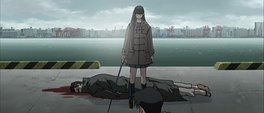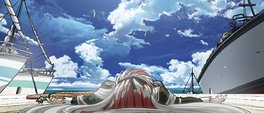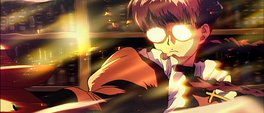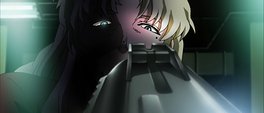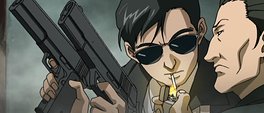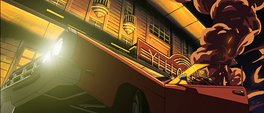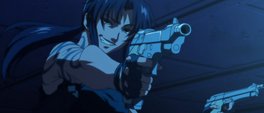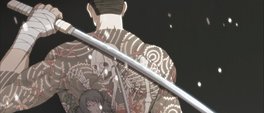Black Lagoon
The first two episodes of Black Lagoon are a carnival of ridiculousness. The climax of the opening story sees a boat use a ramp to launch torpedoes at a pursuing helicopter while the instigator of the plan flips off the doomed pilot. To say the series is quite silly would be an understatement. Even through two seasons it doesn't ever forget just how absurd a lot of it is, but tempering that craziness is a slick and very poignant look at villainy, existentialism, obligation and trust. What makes this mix so rare - gunfights, car chases and philosophising - is how well they meld together and crucially how entertaining the entire package is.
The series starts atypically enough with a Japanese salaryman, Rock, being kidnapped by a mercenary company, the titular Black Lagoon, and opting to stay with them after his initial ordeal is over. The story follows him through the exploits of the company and his attempts to come to terms with his new life within a city a villains. The narrative is broken up into a collection of stories lasting anywhere from two to five episodes and involve a transport job gone wrong to an overseas gang war and all points in between. As well as the three other members of the Black Lagoon company, Rock collides with an eclectic batch of characters including combat maids, scarred Russian soldiers and pistol toting nuns.
Black Lagoon is split into two series, the second using the subtitle "The Second Barrage", and even though they were aired shortly after one another, the latter is the more competent one and wisely moves away from the boats and bombs that characterised the former. Both are strong series, the first is tasked with introducing the particularly skewed logic the city of Roanapur works to and favours pomp and spectacle more than thoughtful repose; the second, with the cast now set, is free to explore the vicious and nihilistic underbelly of the myriad organisations and ongoing power struggles. Just as the second finds time for silliness, so too does the first pause and soliloquise at times.
The gung-ho attitude is delightfully approachable but at no point does the story or characters let one forget that they are all marauding criminals and that there aren't any loveable rogues, only degrees of villainy. The violence switches from glorified to grievous in a heartbeat, never shying away from demonstrating its savagery and remaining poignant when necessary. The duality between childlike abandon and adult seriousness is unique and gifts the series with sentiment that one wouldn't expect it capable of. So while rife with despicable acts the unreality of the characters and story transforms the series from po-faced crime drama to pulpy entertainment; at no point would one want to meet any of the miscreants featured, but damned if their jaunts aren't hugely watchable.
Characters such as a Balalaika - a disfigured Russian sniper who now leads the feared Hotel Moscow - walk a knife edge between depravity and viciousness. Borne out of pragmatism rather than a desire to enact evil, her character was forged out of warzones and lost dreams; frequently shown as understanding but ultimately ruthless. It is only through the superbly poised writing that she can be portrayed as paragon of leadership while still murdering the local gang cells. The second season wisely shifts the focus away from the core group of the Black Lagoon company to characters and storylines with more mileage; volumes are spoken by making a straightlaced salaryman the most interesting character of all and able to carry the series without ever firing a gun.
Madhouse take up animation duties and prove once again that given the money and the material, they can produce some splendid results. Like the story, the animation can be categorised by the series: the first favours the bright and over-saturated colours of a tropical resort while the second opts for cooler, more subtle hues ending with an enchantingly atmospheric trip to Japan in the grip of winter. In a change from the norm, overall visual fidelity improves with each episode rather than degrades and the second season habitually has moments of outstanding beauty. Action is dealt with similar equanimity and a focus on detail and unintrusive direction, firearms and vehicles are lavished with attention and the frequent explosions that punctuate the shoot outs and high-speed chases are wonderful.
Black Lagoon is a deceptive series, beguiling with guts and gloss before surreptitiously peeling back the shine to reveal an intricate world beneath; it's the set pieces which dazzle but the themes which give the series longevity. With news of a third season in production and the manga still ongoing, there is so much more to love about Black Lagoon. The switch to a more sombre and cogitative pace from balls-to-the-wall action will still be too abrupt for some, but it weens out those looking for brainless fun and leaves only those enraptured by a setting that is voyeuristically intriguing but thankfully hard to empathise with.
Miscellanea
The opening track - Red Fraction by MELL - is probably a reference to to the militant Japanese Red Army Faction featured in the show or perhaps the Red Army Faction from 1970's West Germany who in the native language were Rote Armee Fraktion. MELL is one of the main vocalists for the production group I've whose ranks include the popular Kotoko.
Revy's weapon of choice is a pair of modified Beretta 92FS semi-automatic pistols which are nicknamed "Sword Cutlass". Dutch meanwhile has been seen to wield a Remington 870 shotgun and a Smith and Wesson 629 revolver. Sister Eda uses a Glock 17L as well as an Arwen 37 grenade launcher. Other heavy ordnance includes an M79 grenade launcher ("Thumper"), a Browning Automatic Rifle and an M60 automatic machine gun. More at the IMFDB page on Black Lagoon.
Hotel Moscow's leader's name, Balalaika is a reference to both the classic Russian musical instrument as well as the Russian army slang for the Dragunov Sniper rifle she used during her time in Afghanistan.
The promo video uses a track from the Black Lagoon soundtrack: Don't Stop! by The Mad Council, an entirely unknown group with only the single track reported to be by them. The soundtrack is mostly credited to EDISON, another almost entirely unknown artist with no other works verifiably attributed to them.
Vitals
First aired: 8 April 2006
Finished airing: 18 December 2006
Episodes: 24
Availability: DVD - Amazon.com, Amazon.co.uk, United Publications (UK)
References: MyAnimeList, Wikipedia, AniDB, IMFDB - Black Lagoon
